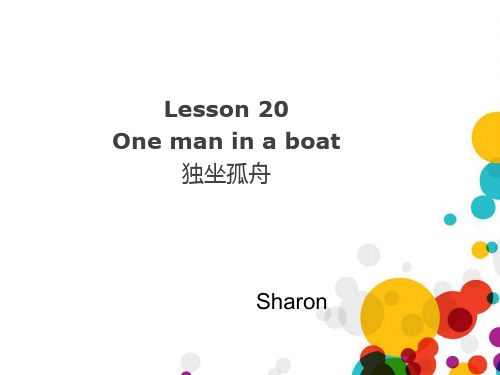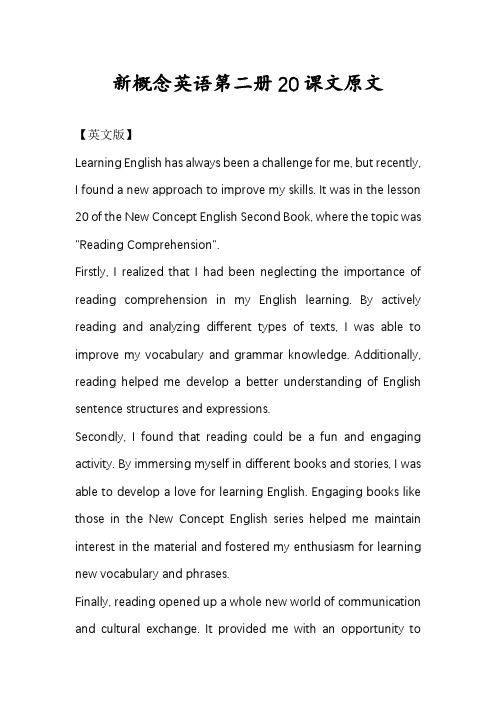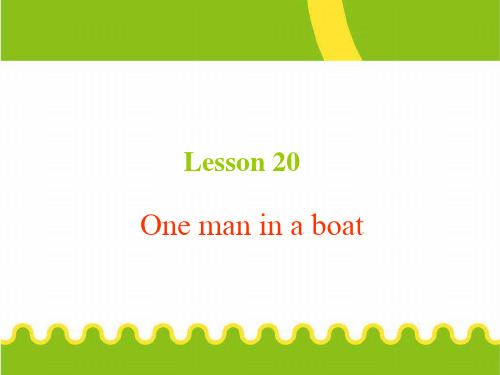新概念二册Lesson 20课件
新概念第二册lesson20

• catch fisherman boot waste realize
v. n. n. n. v.
抓到 钓鱼人, 渔民 靴子 浪费 意识到
【New words and expressions】 ★ catch v. 抓到 (caught;caught)
The early bird catches the worm. 捷足先登。 catch fish/ a thief catch a cold:染上感冒---have a cold catch the bus:赶车-----miss the bus 错过车 catch one’s attention/ eyes吸引某人注意力 catch fire:着火(动作)
★ boot n. 靴子
a pair of boots running shoes 跑鞋 tennis shoes 网球鞋 leather shoes 皮鞋 sandles 凉鞋 sneakers 轻便运动鞋 (Am.) slipper 拖鞋
★ waste vt./n. 浪费 waste 1) vt.浪费
Answer the questions: 1.What is the writer’s favourite sport? 2.What do some unlucky fishermen catch? 3.Is the writer as lucky as they are, or is he not so lucky? 4.Does he ever catch anything? 5.Is he really interested in fishing? 6.What is the only thing that interests him?
It is a means of relaxation. He enjoys the peace of mind.
新概念英语第二册课件Lesson20(共29页)

【Key structures】关键句型
• spend+时间+在某地 在某地度过……时间 • I spent a whole day in the room, but I
didn’t write a single word.
• after <conj.>+从句 在……之后 • After <prep.>+ doing 在…..之后 • After I went to school, I learned a lot of
★realize v. 意识到
• ① v. 认识,知道,明白,意识到 • I went into the wrong room without
realizing it. • ② v. 实现(希望、目标、愿望等) • realize one's dream 实现某人的梦想 • ③ 使变为事实,使发生(常用于被动语态) • This plan can never be realized.
• I was worried about my brother for he caught a serious cold.
• Instead of catching fish, they catch old boots and rubbish.
• instead of… 而不是… 可以放于句首或句尾 • I went to school instead of staying at home. • She bought a book for me instead of buying a dress.
新概念英语第二册20课文原文

新概念英语第二册20课文原文【英文版】Learning English has always been a challenge for me, but recently,I found a new approach to improve my skills. It was in the lesson20 of the New Concept English Second Book, where the topic was "Reading Comprehension".Firstly, I realized that I had been neglecting the importance of reading comprehension in my English learning. By actively reading and analyzing different types of texts, I was able to improve my vocabulary and grammar knowledge. Additionally, reading helped me develop a better understanding of English sentence structures and expressions.Secondly, I found that reading could be a fun and engaging activity. By immersing myself in different books and stories, I was able to develop a love for learning English. Engaging books like those in the New Concept English series helped me maintain interest in the material and fostered my enthusiasm for learning new vocabulary and phrases.Finally, reading opened up a whole new world of communication and cultural exchange. It provided me with an opportunity tounderstand different cultures and perspectives from a global perspective. Through reading, I developed a deeper understanding of English language users and their customs, which helped me communicate more effectively with them.【中文版】英语学习对我来说一直是一个挑战,但最近我找到了一种新的方法来提高我的技能。
新概念第二册ppt课件

• 以下短语中名词前不加冠词与加冠词意思有区别 • go to school 去上学; go to the school 去学校; • go to hospital去看病; go to the hospital去医院
3、I did not enjoy it. enjoy vt. 欣赏,享受,喜爱 ① enjoy +n. 喜欢,从当中得到一种享受(后面不能跟人) eg. I enjoy the music. enjoy the dinner\film\game ② enjoy oneself/代词 玩的开心 eg. We always enjoy ourselves. ③ enjoy +动名词 eg. Jane doesn’t enjoy swimming.
【课文讲解】
1、Last week I went to the theatre. • go to the +地点 表示去某地干什么事 • go to the theatre = go to the theatre to see a play去剧 场看戏 • go to the cinema =see a film 去电影院看电影
+ to sb. \ sth.
★business n. 事, 生意 • ① n. 生意 • businessman 生意人 • businesswoman • do business: 做生意 • go to some place on business:因公出差 eg. I went to Tianjin on business.
新概念第二册一课一练Lesson20

====Word 行业资料分享--可编辑版本--双击可删====源-于-网-络-收-集 Lesson 20 One man in a boat1. 2. This summer sandals are out; ________________ are in.3. They burned up all the garden ________________ yesterday afternoon.4. Envy is a ________________ of time. You already have all you need.5. Did you read the article about the rescue of the two ________________?. 根据汉语提示完成下列句子。
1. “不管他参加还是不参加,我都不会为此担忧,”菲尔说道,“那不会困扰我。
”“Whether he makes it or doesn’t make it, I’m not worried,” Jackson said. “That ________________.”2. 你可以拿走我们的钱、房子、车子,甚至衣物,但我们还是可以生存。
You can take away our money, house, car, ________________ our clothes and we cansurvive.3. 我能够放弃我的性格、我的嗜好、我的兴趣和我的生命,却不能放弃你。
I can ________________ my personality, my hobby, my interest and my life, but not you.4. 我们应该认识到金钱并不是生命中最重要的事情。
We ________________ that money is not the most important thing in life.从[A]、[B]、[C]、[D]四个选项中,选出可以填入空白处的最佳选项。
新概念第二册lesson20课件

而在It’s important … / It’s necessary … / It’s advisable … / It’s essential … / It’s fitting … 这类句型中,只能用不定式,如: It’s important to learn foreign languages. It’s quite necessary to read it many times.
Subject
1) V-ing 形式作主语 往往表示抽象、笼 统的动作或泛指某动作或行为。如: a.) Getting up early is a good habit. b.) Fishing is Tom’s favorite hobby. c.) Crying over spilt milk is no use. d.)Arguing with him is a waste of time.
注①:动名词作表语与不定式作表语的区别:
动名词作表语时表示比较抽象的一般行为、习惯;不
定式作表语时表示具体的某一次动作,特别是将来的动作,
试比较:
My favourite sport is swimming.
The first thing for us to do is to improve our
Predictive
2) V-ing形式作表语 (放在系动词之后,泛指 某种动作或行为,常用来说明主语的身份、内 容或特点。)如:
a.) My job is testing all kinds of software. b.) The purpose of my letter is advising you to do more sports. c.) His greatest happiness is serving the people. d.) Seeing is believing.
新概念第二册第20课完整ppt课件

★fisherman n. 钓鱼人,渔民
fish→ fisherman (pl.fishermen) [注]不要忘了er哦 1)fish 鱼 (pl.) 单复数同形 They caught many fish that morning. 2)fishes 不同种类的鱼 He studies the fishes in the Indian Ocean
realize one's hope/dream/plan He realized his dream at last. →His dream was realized at last. come true 成为现实 (物作主语,无被动语态) Her dream has come true.
精选ppt
eg. The little boy was caught stealing apples from the
garden
精选ppt
The early bird catches the worm. 捷足先登。
catch it 被责骂,受处罚(口)(通常与will 等连用) If I come home late, I’ll catch it from my mother. catch up with 赶上,跟上 Go ahead please.I’ll soon catch up with you. catch phrase 标语,引人注意的句子
精选ppt
★realize v. 意识到
real adj.真的 → realize v.意识到→reality n.现实 1)认识到,意识到 (不用于被动语态,不用于进行时态,
人做主语。) realize one's mistake She realized that he was lying. 2) vt.实现(计划等)(可用于主动,也可用于被动)
新概念第二册ppt课件

Lesson 1 A Private Conversation
• private • conversation • theatre • seat • play • loudly • angry • angrily • attention • bear • business • rudely
2021/7/31
2021/7/31
★attention n. 注意
• Attention ,please. 请注意(口语) • pay attention 注意
• pay attention to … 对……注意 eg. You must pay attention to that girl.
• pay a little attention 稍加注意 • pay much attention 多加注意 • pay no attention 不用注意 • pay close attention 特别注意
剧场看戏 • go to the cinema =see a film 去电影院看电影
• 以下短语中名词前不加冠词与加冠词意思有区别 • go to school 去上学; go to the school 去学校; • go to hospital去看病; go to the hospital去医院
2021/7/31
adj. 私人的 n. 谈话 n. 剧场,戏院 n. 座位 n. 戏 adv. 大声地 adj. 生气的 adv. 生气地 n. 注意 v. 容忍 n. 事 adv. 无礼地,粗鲁地
★private adj.私人的
• private life 私生活 • private school 私立学校 • It's my private letter.
新概念英语第二册_lesson_20

No, __n_o_t_h_in_g___. ④ Parents could do e_v_e_r_y_t_h_in_g_ for their
children.
4 But this does not worry me. worry v. 烦恼,担忧 sth. worry sb. 某人为…烦恼,担忧 (作动词一定要加人作宾语)
Less+原形 A is less…than B: A不如B Lucy is less smart than Lily.
8 You must give up fishing! give up doing sth.=stop doing sth. 放弃做 某事
(1) I would never give up _______(dream) as a lawyer.
(2) A policeman would never give up _________(fine) you if you park the car in a wrong place.
9 I am not really interested in fishing.
be interested in sth./doing sth. :对…感兴趣
大多数现在分词和许多过去分词都可以作形容词用。 以-ed结尾的形容词常与人称主语连用,表示人的情 绪、状态、喜好等;以-ing结尾的形容词则常与费人 称主语连用,表事物的某种特征、性质等。
Fishing is not interesting. I’m not interested in
arew__a_s__t_in__g_
my
time.
.
11 Realize v. 意识到 ① v. 认识,知道,明白,意识到
新概念英语第二册Lesson1-Lesson2课件

Language points
1. private adj. 私人的 private letter/house ;private school:私立学校
private life 私生活
private space 私人空间
public
公共的,公开的
pubic letter 公开信
public place 公共场所
10. In the end, I could not bear it. bear v. 容忍 eg. I can't bear it. 我受不了了。 stand=put up with=bear 都可以表 示容忍 bear n. 熊 a big black bear 一头大黑熊
in the end:最后,终于 finally; at last
简单陈述句:了解其功能;理解其语 序及组成部分。 The policeman arrested the thief . 主语 谓语 宾语
The thief arrested the policeman.
主语 谓语 宾语
主语;谓语;宾语;方式状语;地点状语;时间状语 主语;谓语;表语
6
1主语
Which? What?
Listen and read the text to find out the answers to the following questions
• • • • • •
1 What day was it? 2. When did you get up last Sunday? 3. What was it like outside? 4. Did you think it was a nice day? 5. What happened just then? 6. Who was on the phone?
新概念第二册

【Key structures】
▪ 情态助动词must ▪ Must译为必须,可以表示必要,命令或强制,邀
请,决心,不可推卸的责任等多处含义。它没有 时态和人称变化,通常只用于现在时和将来时。 在其他时态时,must的有些含义可以用have to 或have got to。这三种形式一般可以互换,但用 于第一人称时,have to(have got to)强调客观 的要求或外在的原因,must则强调主观的要求 或表示说话的人认为自己有权做某事。
My aunt Jennifer is an actress. She must be at least thirty-five years old. In spite of this, she often appears on the stage as a young girl. Jennifer will have to take part in a new play soon. This time, she will be a girl of seventeen. In the play, she must appear in a bright red dress and long black stockings. Last year in another play, she had to wear short socks and a bright, orange-colored dress. If anyone ever asks her how old she is, she always answers, 'Darling, it must be terrible to be grown up'
▪ ever = at any time 任何时候(时间副词) ▪ it must be 一定……(表示推测) ▪ grown-up adj. 成年人 ▪ be grown-up 作为一个成年人 ▪ grow up (人)成长 ▪ 当有人问你年龄时,你可以这样回答:
新概念英语第二册课课件 Lesson

•A public house which was recently bought by Mr. Ian Thompson is up for sale.
•a public house 酒吧、酒店,口语缩略为pub •up for sale 有待出售,供出售 •be up for 有待于…,为了某一目的 •This problem is up for discussion. •这个问题有待于讨论。 •on sale 打折卖 for sale 待售;出售
• ★shake(shook,shaken) v. 摇动 • vt.&vi. 摇,摇动,抖动 • Mr. Thompson shook his head. • His hands appear to be shaking. • 他的手看上去在发抖。 • ② vt. 同…握手 • Dan shook hands with him.
A public house which was recently bought by Mr. Ian Thompson is up for sale. Mr.Thompson is going to sell coming from the bar. The next morning, he found that the doors had been blocked by chairs and the furniture had been moved. Though Mr.Thompson had turned the lights off before he went to bed, they were on in the morning.He also said that he had found five empty whisky bottles which the ghost must have drunk the night before. When I suggested that some villagers must have come in for a free drink, Mr.Thompson shook his head. The villagers have told him that they will not accept the pub even if he gives it away.
新概念2册Lesson 20 One man in a boat课件

3.But this does not worry me.
Lesson 20
One man in a boat
One man in a boat
Do you like fistion and enjoying the peace of mind
When we are planning to go fishing, what should we take?
2.I often fish for hours without catching anything. • 这里的fish是不及物动词。 • for hours = for several hours几个小时 • without是with的反义词,表否定。 • 介词+doing(简称“介doing”戒毒) • 动名词catching作介词without的宾语。 • 例句: • After talking to him, I felt better. • Thanks for inviting me.
Read and answer the following question: • Why is fishing the writer’s favorite sport? • He is only interested in sitting in a boat and do nothing at all!
firsherman n. 钓鱼人,渔民
boot n. 靴子 a pair of boots
一双靴子
waste
• • • • • • • • • v. 浪费 We should not waste time. n. 浪费 It's only a waste of time to speak to her. 和她说话纯粹是浪费时间。 a waste of… 浪费…… It is a waste of time/money/food/water.。 Waste not, want not. =If you never waste anything, you’ll never lack it. 不 浪费,就不缺乏。(尤指食物或钱)
新概念英语第二册 Lesson 20

fish hook 钩
fishing line
fishing net 网
【New words and expressions】 catch fisherman boot waste realize v. 抓到 n. 钓鱼人,渔民 n. 靴子 n. 浪费 v. 意识到
★catch v. 抓到(caught; caught) ① vt. 捉住,逮住,捕获 catch fish, catch thief The police have caught the thief. ② vt. 抓住,握住 Can you catch the ball? ③ vt. 及时赶到,赶上 catch the bus:赶车 ----- miss the bus 错过车 ④ catch的一些固定用法 catch a cold:染上感冒---have a cold catch fire:着火(动作)---be on fire(状态) catch one’s attentionh 摒住呼吸 catch sight(看见) of = see : 看见
★fisherman n. 钓鱼人, 渔民 fish→ fisherman [注]不要忘了er哦 1)fish 鱼 (pl.) 单复数同形 They caught many fish that morning. 2)fishes 不同种类的鱼 He studies the fishes in the Indian Ocean drink like a fish 牛饮 like a fish out of water 如鱼离水 fries fish fresh fish salted fish 3)fish v. 钓鱼 go fishing/swimming/shopping fishing in troubled water 浑水摸鱼
新概念英语第二册第20课完整ppt课件

精选ppt
Lesson20 One man in a boat
• Fishing is my favourite sport.
• fish + ing = fishing • v. + ing = 动名词 (做主语) • I often fish for hours without catching
anything. • fish (v.) 钓鱼 • for + 一段时间 • without (prep.)没有 • He left without telling me. • catching 动名词做精宾选pp语t
• But this does not worry me.
• worry (v.) 使…担心
精选ppt
• ☺ 懂得,理解 = understand • catch the sentence
• ☺catch up with sb. • 赶上… • catch one’s atth fire • 着火
精选ppt
• 2. fish ☺(c. n.) 鱼
and doing nothing at all ! • only 只是 • = just • not at all
精选ppt
• Fishing is my favourite sport. I often fish for hours without catching anything. But this does not worry me. Some fishermen are unlucky. Instead of catching fish, they catch old boots and rubbish. I am even less lucky. I never catch anything-not even old boots.
新概念英语第二册学生用书Lesson20

3 Aftef having spent whole mornings on the river,在河上呆了整整一个上午之后。由 于作介词after的宾语的动名词所表示的动作发生在谓语动词go之前,因此,动名词要用完成 ce02s20.htm
2013-1-17
Watching television is my favourite pastime. 看电视是我最喜爱的业馀爱好。 Reading in bed is something I always enjoy. 我总喜欢躺在床上看书 b 动名词作宾语 I am very keen on cycling. 我非常喜欢骑自行车。 She is afraid of staying in that house alone. 她害怕单独住在那间屋子里。 He is capable of doing anything. 他能胜任任何事情。
Summary writing 摘要写作
Answer these questions in not more than 50 words. 回答下列问题,将答案组成一个段落,不要超过50个单词。 1 What is the writer's favourite sport? 2 What do some unlucky fishermen catch? 3 Is the writer as lucky as they are, or is he not so lucky? 4 Does he ever catch anything? 5 Is he really interested in fishing? 6 What is the only thing that interests him?
- 1、下载文档前请自行甄别文档内容的完整性,平台不提供额外的编辑、内容补充、找答案等附加服务。
- 2、"仅部分预览"的文档,不可在线预览部分如存在完整性等问题,可反馈申请退款(可完整预览的文档不适用该条件!)。
- 3、如文档侵犯您的权益,请联系客服反馈,我们会尽快为您处理(人工客服工作时间:9:00-18:30)。
You are wasting time. Don’t waste your time,money and energy.
2) n. 浪费 a waste of 对…的浪费
It is a waste of time/money/feeling/food. wastebasket 字纸篓 (美) wastepaper basket 字纸篓 (英)
It’s no use crying over spilt milk. (抽象)
He realized that to go on like this was no use. (具体)
练习题: 用括号内动词的适当形式填空: 1._______ (listen) to pop music is something he Listening enjoys. finishing 2.The workers left after ________ (finish) the work. 3.After __________________ (spend) the money, he having spent/spending wrote to his father. 4.You should apologize to your teacher for ______ coming (come) late. 5.We can learn how to write by ______ (read). reading 6.Don’t be afraid of ______ (ask) questions. asking 7.Are you interested in playing (play) volleyball? ______ 8.He left home without locking ______(lock) the door.
千山鸟飞绝, 万径人踪灭, 孤舟蓑笠翁, 独钓寒江雪
It is a means of relaxation. He enjoys the peace of mind.
【课文讲解】
Fishing is my favourite sport. favourite adj. 最喜欢的 无比较级,最高级 Red and Black is my favourite book. n. 心爱的人(物) ,最喜爱的东西 That song is one of his favourites. She is her aunt’s favourite
I often fish for hours without catching anything
without (doing)sth 没有(做)某事 (句首,句尾)
I can not live without you. Fish can not live without water. • He went out and he didn’t say anything He went out without saying anything.
★ realize v. 意识到
real adj.真的 → realize v.意识到→reality n.现实 1)意识到 (不用于被动/进行时态,人做主语。) Realize one's mistake he realized that he was lying. 2) vt.实现(计划等)(主动,被动) realize one's hope/dream/plan He realized his dream at last. →His dream was realized at last. come true 成为现实 (物作主语,无被动语态)
After having spent whole mornings on the river, I always go home with an empty bag. after(conj.)+从句,从句主语是主句的主语.可 换成下面一种形式 after(prep.)+(doing) sth 强调事情 having done sth 强调时间先后 After I go to school,I learned a lot of knowledge. After the students handed in their papers, the teacher left. spend time +sw. spend time/money/ on sth. (in) doing sth.
动名词作表语与不定式的区别: 动名词表示比较抽象的一般行为、习惯; 不定式作表语时表示具体的某一次动作,特别是 将来的动作,
My favourite sport is swimming.
The first thing for us to do is to improve our
pronunciation.
New Concept English Ⅱ
Lesson 20 One man in a boat 独坐孤舟
FISH Fish begins to stink at the head.
〔谚语〕上梁不正下梁歪,鱼要腐烂头 先坏。 Never offer to teach fish to swim.
〔谚语〕别班门弄斧
First listen and then recite the passage 听录音,然后背诵课文 钓鱼是我特别喜爱的一项运动。我经常一钓数 小时却一无所获,但我从不为此烦恼。有些垂钓 者就是不走运,他们往往鱼钓不到,却钓上来些 旧靴子和垃圾。我的运气甚至还不及他们。我什 么东西也未钓到过 — 就连旧靴子也没有。我总 是在河上呆上整整一上午,然后空着袋子回家。 “你可别再钓鱼了!”我的朋友们说,“这是浪 费时间。”然而他们没有认识到重要的一点,我 并不是真的对钓鱼有兴趣,我感兴趣的只是独坐 孤舟,无所事事!
Instead of catching fish, they catch old boots and rubbish.
instead of (doing) sth 不做…(而做..)(句 首/尾) instead of强调这件事没做而做了另一件事 without +(doing) sth强调没有做某件事, I bought books instead of buying dresses. 昨天我没在家,而是上学了。 I went to school instead of staying at home yesterday. 有时我没吃早饭就上学了。
★ fisherman n. 钓鱼人,渔民 fish→ fisherman (pl.fishermen) 1)fish un. 鱼肉 cn. 鱼 (pl.) 单复数同形 不同种类的鱼fishes a cold fish 冷漠的人(贬) v. 钓鱼 I like/enjoy/am fond of/am keen on fishing go fishing
★ boot n. 靴子
a pair of boots running shoes 跑鞋 tennis shoes 网球鞋 leather shoes 皮鞋 sandles 凉鞋 sneakers 轻便运动鞋 (Am.) slipper 拖鞋
★ waste vt./n. 浪费
waste 1) vt.浪费
I am even less lucky. A is less lucky than B more This story is less interesting than that one. not so/as ...as 不及,不如 I am not so happy as before. This story is not so interesting as that one.
What’s your hobby?
answer the questions
1.What is the writer’s favourite sport? 2.What do some unlucky fishermen catch? 3.Is the writer as lucky as they are, or is he not so lucky? 4.Does he ever catch anything? 5.Is he really interested in fishing? 6.What is the only thing that interests him?
9._________ (teach) English is my job. Teaching walking 10.Why does he enjoy________ (walk) in rain? 11.He apologized for _________ (not hand) in the not handing homework on time. 12.Instead of ________ (go) to see a doctor, he lay in going bed and had a sleep. 13.I stayed in bed all day instead of ________ (go) to going work. 14.A lot of men have given up _________(wear) hats. wearing 15.She is very interested in ________ (dance). dancing 16.On _______ (enter) the room, he turned on the light. entering
【New words and expressions】 生词和短语 ★ catch v. 抓到 (caught;caught)
The early bird catches the worm. 捷足先登。 catch fish,/ a thief catch a cold:染上感冒---have a cold catch the bus:赶车-----miss the bus 错过车 catch one’s attention/ eyes吸引某人注意力 catch fire:着火(动作
